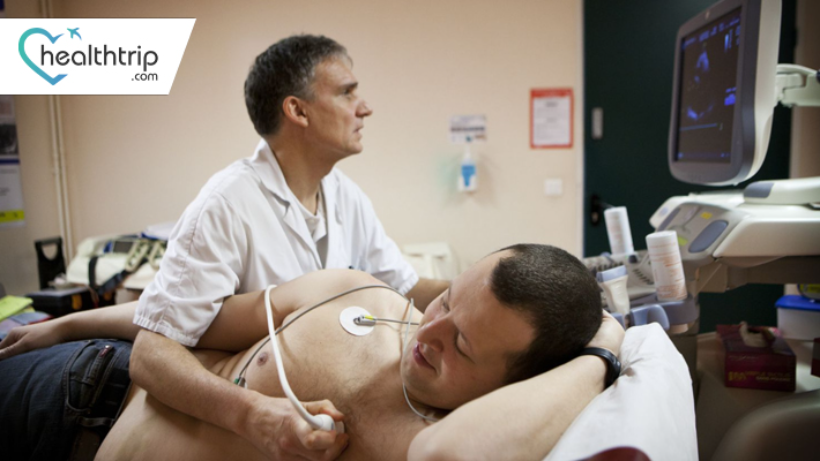
Menyahkod Ujian Gema Tekanan: Panduan untuk Kesihatan Jantung
08 Sep, 2023
 Healthtrip
HealthtripHati manusia, maestro berirama dalam hidup kita, patut dijaga dan diteliti dengan berhati-hati. Di dalam diagnostik jantung, ujian Echo Stress berdiri sebagai pemain penting. Panduan Komprehensif ini akan menavigasi anda melalui ujian Echo Stress, memperkenalkan tujuan, prosedur, kepentingan, dan tips dan strategi pengurusan yang berharga untuk memastikan hati anda tetap menjadi konduktor kehidupan yang harmoni.
Membentangkan Ujian Echo Tekanan
Pandangan tentang Ketahanan Jantung
Ujian Gema Tekanan, juga dikenali sebagai Ekokardiografi Tekanan, ialah prosedur pengimejan jantung khusus yang direka untuk menilai cara jantung anda bertindak balas terhadap tekanan. Ia memberikan pandangan penting ke dalam struktur dan fungsi hati anda, terutamanya dalam keadaan yang mencabar.
Tujuan Disebalik Stres Gema
Mentafsir Tindak Balas Tekanan
Ujian Gema Tekanan mempunyai dua tujuan utama:
- Wawasan Diagnostik: Ia membantu mendiagnosis atau menilai penyakit arteri koronari, gangguan injap jantung, dan keadaan jantung lain yang mungkin tidak nyata.
- Penilaian risiko:Ia menilai risiko kejadian berkaitan jantung pada masa hadapan, seperti serangan jantung, pada individu yang mempunyai faktor risiko atau gejala tertentu.
Prosedur Gema Tekanan
Menangkap Prestasi Jantung Masa Nyata
Memahami cara Ujian Gema Tekanan berfungsi dan perkara yang berlaku semasa prosedur adalah asas::
- Ekokardiogram asas:Semasa rehat, juruteknik mahir menjalankan ekokardiogram, menghasilkan imej struktur dan fungsi jantung anda.
- Induksi Tekanan: Tekanan fizikal diinduksi melalui latihan seperti berjalan kaki treadmill atau berbasikal pegun untuk meningkatkan kadar denyutan jantung anda dan mensimulasikan keadaan tekanan.
- Pemantauan Berterusan:Kadar jantung, tekanan darah dan simptom anda dipantau dengan teliti sepanjang ujian.
- Ekokardiogram Selepas Tekanan:Sejurus selepas bersenam, ekokardiogram lain dilakukan untuk memerhatikan bagaimana jantung anda bertindak balas terhadap tekanan.
Kepentingan Gema Tekanan
Memperkasakan Kesihatan Jantung
Ujian Gema Tekanan memberikan beberapa faedah penting:
- Diagnosis yang tepat:Ia membantu dalam mendiagnosis penyakit arteri koronari, masalah injap jantung dan keadaan jantung lain dengan tepat.
- Stratifikasi Risiko:Bagi individu yang mempunyai penyakit jantung atau faktor risiko yang diketahui, ia membantu menilai risiko kejadian jantung pada masa hadapan.
- Rawatan Termaklum:Hasil daripada keputusan rawatan panduan ujian, seperti pengurusan ubat atau keperluan untuk prosedur invasif selanjutnya.
Petua untuk Ujian Gema Tekanan
Bersedia untuk Pengalaman Lancar
Sebelum Ujian Gema Tekanan anda:
- Ikut arahan: Mematuhi garis panduan penyediaan yang disediakan oleh penyedia penjagaan kesihatan anda, yang mungkin termasuk pengurusan puasa atau ubat.
- Pakaian Selesa:Pakai pakaian yang selesa dan kasut yang sesuai untuk bersenam.
- Hidrat: Kekal terhidrasi dengan baik sebelum ujian.
- Maklumat Ubat: Maklumkan pembekal penjagaan kesihatan anda tentang sebarang ubat yang sedang anda ambil.
Strategi Pengurusan Gema Tekanan
Terima Pilihan Sihat Jantung
Selepas Ujian Gema Tekanan anda, pertimbangkan strategi pengurusan ini:
- Perubahan gaya hidup:Amalkan gaya hidup sihat jantung dengan senaman yang kerap, diet seimbang dan pengurusan tekanan.
- Pematuhan ubat: Jika ubat yang ditetapkan, ambil ubat tersebut seperti yang diarahkan oleh pembekal penjagaan kesihatan anda.
- Pemeriksaan Berkala:Menghadiri temu janji susulan biasa untuk memantau kesihatan jantung anda.
- Pengurangan Tekanan:Laksanakan teknik pengurangan tekanan seperti meditasi atau yoga.
Ujian Gema Tekanan ialah sekutu yang kuat dalam bidang kesihatan jantung. Dengan mendedahkan cara jantung anda bertindak balas terhadap tekanan, ia menyediakan maklumat penting untuk diagnosis, penilaian risiko dan penjagaan jantung proaktif. Apabila pembekal penjagaan kesihatan anda mengesyorkan Ujian Gema Tekanan, pertimbangkan ia sebagai langkah penting dalam memahami dan memelihara kesejahteraan jantung anda. Simfoni hati anda sepatutnya harmoni, dan Ujian Gema Tekanan membantu memastikan ia selaras.
Ubah Kecantikan Anda, Tingkatkan Keyakinan Anda
Cari kosmetik yang betul prosedur untuk keperluan anda.

Kami pakar dalam pelbagai jenis daripada prosedur kosmetik

Prosedur paling popular dalam
Jumlah Penggantian P
Diskaun sehingga 80%.
90% Dinilai
Memuaskan

Jumlah Penggantian P
Diskaun sehingga 80%.
90% Dinilai
Memuaskan

Pembedahan Kanser Pa
Diskaun sehingga 80%.
90% Dinilai
Memuaskan

Jumlah Penggantian L
Diskaun sehingga 80%.
90% Dinilai
Memuaskan

Jumlah Penggantian L
Diskaun sehingga 80%.
90% Dinilai
Memuaskan

Rawatan Kesihatan
Beri diri anda masa untuk berehat
Harga Terendah Dijamin!

Harga Terendah Dijamin!





